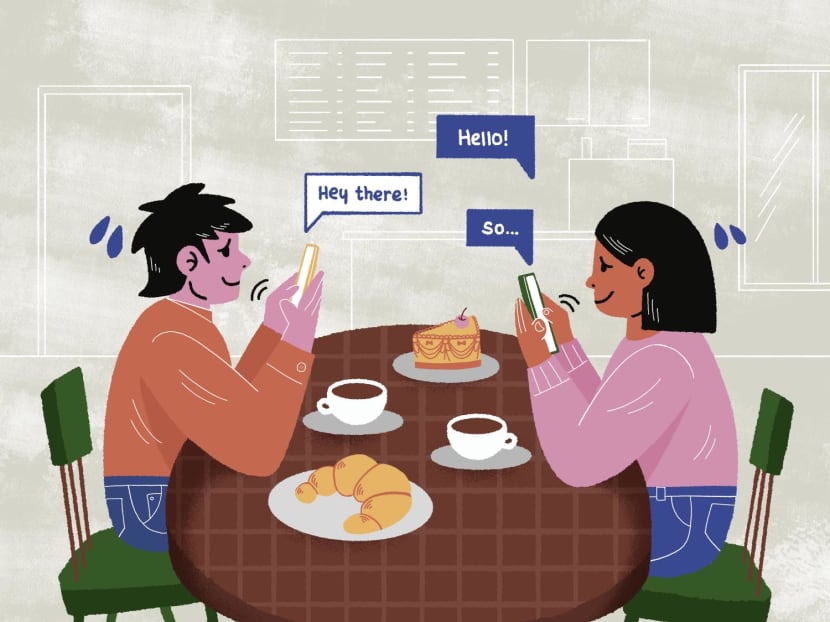Amid concerns of loneliness and isolation, youths say they are trying to overcome fears of 'complex' in-person interactions
SINGAPORE — For 19-year-old Kaegan Teo, an invitation to meet in person, while meaningful, can cause him to feel anxious.


This audio is AI-generated.
- A recent survey showed that more than half of young people aged 21 to 34 reported feeling anxious sometimes if they have to talk to people in person
- A few of the young told TODAY that they worry about being judged and having to deal with the unpredictability of in-person conversations
- They said that a non-judgemental society that encourages open dialogue and understanding may help ease such anxieties
- Researchers said that this anxiety may be fuelled by young people growing up in a digital era, making them more at ease with expressing themselves online
- They also said that the wider effects of a lack of community and social interactions due to social anxiety should not be overlooked
SINGAPORE — For 19-year-old Kaegen Teo, an invitation to meet in person, while meaningful, can cause him to feel anxious.
“The immediacy and unpredictability of in-person conversations can be overwhelming,” the law student at Temasek Polytechnic said.
Even though he recognises that face-to-face meetings are an “authentic way” to connect with people, the pressure to respond quickly and gauge non-verbal cues adds a layer of “complexity” to such occasions.
Similarly, 21-year-old Russell Foo Chuen finds himself feeling more anxious and hyper-conscious when speaking to others in person.
Subtle changes in posture and fidgeting or eye movements that people make in response to something he says causes him to stumble over his words.
“If I start noticing someone’s attention drift off even when they still seem to be listening to what I have to say, (this could lead) to me feeling more nervous,” the full-time undergraduate at Singapore Management University (SMU) told TODAY.
Findings from a recent survey by the Institute of Policy Studies (IPS) show that Mr Foo and Mr Teo are not alone in feeling this way.
The survey — done by IPS ahead of its Singapore Perspectives 2024 conference earlier this week — found that more than half (56 per cent) of the youths aged 21 to 34 surveyed reported feeling anxious sometimes if they have to talk to people in person.
A total of 2,356 Singaporeans and permanent residents aged 21 to 64 were surveyed between November and December last year.
WHERE IS THIS ANXIETY COMING FROM?
Experts said that this anxiety may be fuelled by how these young people grew up — as digital natives who are more at ease expressing themselves in the online realm.
Associate Professor Daniel Goh, a sociologist from the National University of Singapore (NUS), said that the younger generation “obviously are more comfortable” online just because they have grown up with these digital platforms.
Agreeing that the young are generally more accustomed to online interactions, undergraduate Zachary Tay said: “I personally find it easier to talk to people online. This is because those around me tend not to share my interests, whereas it is easier to find groups online that are focused and catered towards those interests.
“I feel slightly more reserved offline, but that’s because when I talk to people online, I expect less judgement since we share hobbies or interests,” the 21-year-old Integrative Studies student at SMU said.
Like him, more than half (53 per cent) of the respondents in the IPS survey who were between the ages of 21 to 34 found it easier to talk to people online than offline.
The young people said that with online conversations, their social anxiety can be better masked and their lack of expertise in any area can also be hidden given that messages sent can be deleted or edited for clarity later, unlike in a face-to-face conversation.
Ms Leong Jia Xin, a 19-year-old student entrepreneur, said: “It’s just like any other thing in life. As long as you’re comfortable with it, you’ll be more inclined to do it.
“Because we are so used to communicating on platforms or online, I guess it gives us (a greater) sense of comfort. But also maybe, general social anxiety is more pertinent in our generation — or it’s more talked about — so more people are (more) aware that they are anxious.”
“Humans are social beings, and being part of a community fosters a sense of connection, provides support, offers social learning, and contributes to the overall well-being of individuals and society as a whole.Dr Chew Han Ei, adjunct senior research fellow at the Institute of Policy Studies”
Transitioning from being a teenager to adulthood during the Covid-19 pandemic, which greatly reduced opportunities for in-person interactions, could have further compounded such anxiety towards offline conversations.
Dr Chew Han Ei, adjunct senior research fellow at IPS, was the principal investigator of the “Youth Steps” longitudinal study done between 2017 and 2022 by IPS and the National Youth Council.
He told TODAY: “The youth in the ‘Youth Steps’ study shared stories with us about missing out on their pivotal life transitions like a gap year, exchange programmes, internships and orientation at work because all they had were Zoom meetings and Zoom lunches.”
This could have led to missed opportunities for building social relations, he said.
Agreeing, Mr Teo, the polytechnic student, said that the heightened anxiety in face-to-face interactions has indeed become more apparent post-pandemic for him after his prolonged reliance on digital communication during lockdowns.
WHAT ARE THE WIDER EFFECTS OF SOCIAL ANXIETY?
Experts said that the wider effects of a lack of community and social interactions due to social anxiety should not be overlooked.
“The community plays a quintessential role in human existence — no man, woman or youth is an island," Dr Chew said.
“Humans are social beings, and being part of a community fosters a sense of connection, provides support, offers social learning, and contributes to the overall well-being of individuals and society as a whole."
He added that without a sense of community, individuals may lack the support networks that can provide emotional and practical assistance during challenging times.
“Social isolation can also lead to adverse effects on mental health and overall quality of life.”
Agreeing, Associate Professor Tan Ern Ser, a sociologist from NUS, said that this ultimately boils down to having access to social capital — which could come in the form of support of all kinds: Emotional, social, financial or informational.
“Having community could mean we survive better in a crisis, when we need mutual support and sharing of information and resources. And as a more morbid example, we don’t die without anyone noticing,” he added.
WHAT WOULD HELP YOUNG PEOPLE OVERCOME THIS?
Some of the young told TODAY that building a more empathetic and non-judgemental society that encourages open dialogue and understanding could help ease the anxiety they feel towards in-person interactions.
As they are still in their years of forming a strong personal identity, the desire to be accepted would affect how they converse and interact with others.
Mr Foo the SMU undergraduate said: “When I was younger during primary and secondary school, I was always very fearful of conversations with strangers, especially people around my age, because I did not want to seem like some weirdo or a person with very niche interest.”
“The desire to be accepted plays a big role in how you speak with others, because you may try all kinds of different tactics to get someone to like you or even just notice your existence, so I was always frightened by the consequence of someone hating me if I said something wrong or something they did not like.”
Others said that they found their way to slowly overcome their anxiety by advocating for issues that they feel strongly about and taking part in activities related to these issues.
Mr Teo the polytechnic student, for example, who at times feels anxious about interacting with people in person, helps at Health Minister Ong Ye Kung’s meet-the-people sessions in Sembawang Group Representation Constituency, and provides feedback during public consultations on issues such as environmental sustainability and social justice.
“Despite occasional social anxiety, the passion for the cause and the belief in the impact of collective efforts motivate me to participate. Overlooking feelings of anxiety is often a conscious choice, driven by the importance of the cause,” he said.
The IPS poll also found that, in the past year, 66 per cent of the youth aged 21 to 34 took part in at least one offline civic activity.
Mr Foo said: “Empathy, I believe, plays a huge role in why youths who are too shy to speak their mind normally in regular face-to-face, day-to-day conversations are then able to rise up to the challenge and face such social issues head on.”
Ultimately though, experts said that there is not too much cause for concern, given that in-person interactions are just one gauge of an individual’s level of social isolation and loneliness.
Such anxiety, they said, may also fade with age and time, especially as the world emerges out of the pandemic.
Mr Tay the undergraduate said: “I expect that (overcoming such feelings of social anxiety) is one of the things that improves with time and experience.
“Like it or not, meeting with people and interacting with them is a part of life, and like any skill, we can develop proficiency in it.”
Dr Shannon Ang, an assistant professor of sociology at the Nanyang Technological University, thus cautioned against “inciting moral panic” and concluding that young people are increasingly lonely or have no social skills.
“Some level of loneliness (just like depressive symptoms) is probably normal to experience.
"What we may need to pay attention to is to make sure this loneliness is not chronic — remaining consistently high even as they age — and to ensure that social support (from friends and family) remains strong,” he said.
“Importantly, we can create space for young people to elucidate, express and pursue their hopes and dreams without judgement — without the heavy expectations, prescriptive life trajectory and hyper-competition that is commonly foisted upon young people today.”










